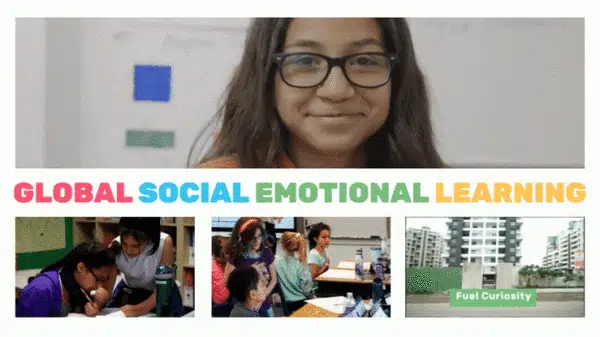Global Social Emotional Learning Research
Read Excerpts from the Social Emotional Learning Research Report
Better World Ed is informed by Social Emotional Learning research and data, global competency research, and educational and behavioral psychology research. Most importantly, it is informed by consistent experiences learning from educators and students.
Our social emotional learning research guides the development of Global Learning Journeys: wordless videos, stories, and lesson plans that encourage the practice of empathy, understanding, and meaningful learning about new cultures and academics. Why: help you(th) love learning about self, others, and our world.
Teachers and students feel Learning Journeys are unique because of the use of real, authentic, and captivating storytelling as a hook and learning foundation. A good story can inspire curiosity in all of us, regardless of age. In the classroom, providing real stories from a unique human’s perspective helps students make deeper connections with what they are learning.
Through wordless videos that share a glimpse of someone else’s world, students tap into and further develop their curiosity — a skill shown to ignite a sense of lifelong learning and to increase academic achievement. Removing the context and prescribed narrative from a video gives students room to use their imagination, another essential life skill, to understand the narrative based on what they see.
Pairing the wordless videos with standards-aligned lesson plans, students and teachers dive into real-world applications of problem-solving and critical thinking. Students have the opportunity to actively explore new regions of our world, and to engage in dynamic learning experiences that increase empathy, curiosity, and problem-solving.

Better World Ed‘s social emotional learning research driven content can be used to teach a variety of topics like math, science, social studies, and literacy all while building social emotional competencies to help students learn to love self, others, and our world.
Meaningful learning happens when students are engaged in their learning, motivated to proudly complete the task at hand, and are eager to participate. And yet it is estimated that by high school between “40%-60% of students become chronically disengaged”, stemming from a lack of social-emotional development in early childhood. This statistic is a reminder that we have so much work to do together in making SEL possible early in life, every day, and everywhere. Building SEL skills in school help students become more motivated and loving humans, well beyond their time in the classroom.
SEL improves student engagement & academic performance
When students can relate to the content they are learning, they activate their curiosity muscles to want to learn more. Providing consistent SEL opportunities plays a major role in a student’s development and approach to school. With more engaged students, schools with SEL programs have experienced a reduction of student fights by half, annually, with an increase in collaboration. Years of scientific research show that SEL, when integrated into the school day, helps develop the “whole child” — leading to greater academic growth, increased high school graduation, and future life success.
Too often we look at SEL as a nice to have — something we simply don’t have the time for but wish we did. Though it’s incredibly important we make the time. Significant research and studies are showing that all learning is “inextricably linked.” Access to SEL not only increases student engagement but leads to even greater academic outcomes. Researchers found that when SEL is embedded within the school curriculum, there is an average increase of 11 percentile points on academic achievement scores compared to their peers who did not receive SEL programming. SEL is a key link to academic success.
SEL improves career readiness
87% of teachers in a survey have expressed that a larger focus on social-emotional learning will positively affect their students’ workforce readiness. More than ever before, business and political leaders are urging schools to also pay close attention to “nonacademic education” to ensure students are learning the critical skills needed for a successful future. The in-demand skills that prepare students the most for present and future 21st-century jobs are the ability to problem solve, be creative, communicate and collaborate.
Social emotional learning improves our overall life experience and outcomes
Character qualities and competencies affect not only a student’s experiences in school, but how they approach every situation throughout their lifetime. The association between SEL instruction and an increase in self-esteem has been shown to improve a person’s mental wellbeing and is correlated with higher salaries over time.
Children who have access to SEL are able to cultivate deeper relationships with others, listen and understand varying perspectives, and get along with people from different backgrounds. SEL from an early age lays the foundation for a strong sense of self to overcome obstacles one faces throughout life. In turn, they can help others do the same as we work towards a better world together.

